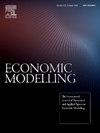How does aging population affect China's monetary policy effectiveness: Empirical evidence and theoretical analysis
IF 4.7
2区 经济学
Q1 ECONOMICS
引用次数: 0
Abstract
This paper investigates how aging population affects the effectiveness of China's monetary policy. While existing literature has shown that aging population weakens monetary policy transmission in developed countries, its implications for emerging economies like China remain unclear. Using the local projection method and Chinese data across varying aging phases, our estimates indicate that the output stimulus from monetary policy is reduced by over 30 % as the population ages. To uncover the underlying mechanism, we construct a New Keynesian DSGE model with perpetual youth, showing that aging dampens monetary policy effectiveness primarily through the investment channel. Unlike developed countries, this effect arises because aging reduces labor supply and lowers the marginal return to capital, weakening investment responses. Our findings suggest that China's recent reform to delay retirement age can mitigate this decline, offering a policy lever to sustain monetary effectiveness amid demographic headwinds.
人口老龄化如何影响中国货币政策有效性:实证与理论分析
本文研究了人口老龄化对中国货币政策有效性的影响。虽然现有文献表明,人口老龄化削弱了发达国家的货币政策传导,但其对中国等新兴经济体的影响尚不清楚。利用本地预测方法和不同老龄化阶段的中国数据,我们的估计表明,随着人口老龄化,货币政策的产出刺激减少了30%以上。为了揭示潜在的机制,我们构建了一个具有永葆青春的新凯恩斯DSGE模型,表明老龄化主要通过投资渠道抑制货币政策的有效性。与发达国家不同,这种效应的产生是因为老龄化减少了劳动力供给,降低了资本的边际回报,削弱了投资反应。我们的研究结果表明,中国最近推迟退休年龄的改革可以缓解这种下降,为在人口结构不利的情况下维持货币有效性提供政策杠杆。
本文章由计算机程序翻译,如有差异,请以英文原文为准。
求助全文
约1分钟内获得全文
求助全文
来源期刊

Economic Modelling
ECONOMICS-
CiteScore
8.00
自引率
10.60%
发文量
295
期刊介绍:
Economic Modelling fills a major gap in the economics literature, providing a single source of both theoretical and applied papers on economic modelling. The journal prime objective is to provide an international review of the state-of-the-art in economic modelling. Economic Modelling publishes the complete versions of many large-scale models of industrially advanced economies which have been developed for policy analysis. Examples are the Bank of England Model and the US Federal Reserve Board Model which had hitherto been unpublished. As individual models are revised and updated, the journal publishes subsequent papers dealing with these revisions, so keeping its readers as up to date as possible.
 求助内容:
求助内容: 应助结果提醒方式:
应助结果提醒方式:


